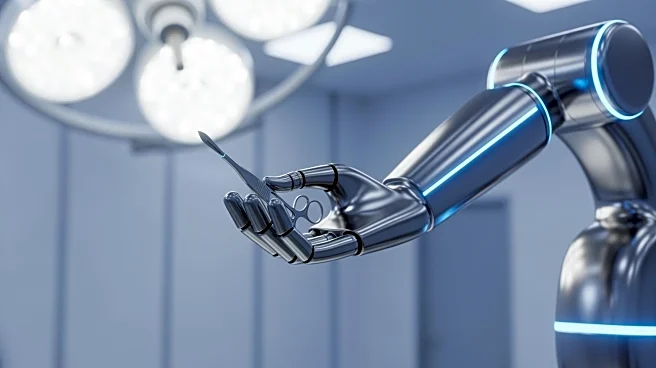What's Happening?
Elon Musk has unveiled a new ambition for Tesla's Optimus robot, suggesting it could eventually perform surgical procedures. Speaking at an event in New York City, Musk highlighted the potential for robots
to address the shortage of skilled surgeons, offering high-quality care to more people. Currently, the Optimus robot is capable of basic tasks such as walking and handling light objects, but Tesla plans to enhance its capabilities significantly by 2026. The company aims to produce up to one million units annually once full-scale production begins. However, experts caution that the integration of robots into healthcare will require extensive testing and regulatory approval, which could take years.
Why It's Important?
The introduction of robots into surgical roles could revolutionize healthcare by increasing accessibility to skilled procedures and potentially reducing costs. For Tesla, this represents a strategic shift from its traditional focus on clean energy to broader technological applications. The move could open new revenue streams and growth opportunities, positioning Tesla as a leader in robotics and AI. However, the path to implementation is fraught with regulatory hurdles and technical challenges, which could impact the timeline and feasibility of this vision.
What's Next?
Tesla plans to showcase a new version of the Optimus robot in early 2026, with enhanced dexterity and precision. The company is also working on scaling up production capabilities to meet its ambitious targets. Meanwhile, healthcare experts and regulators will likely scrutinize the development closely, ensuring that any robotic surgical applications meet stringent safety and efficacy standards. The success of this initiative could depend on Tesla's ability to navigate these challenges and demonstrate the robot's reliability in clinical settings.
Beyond the Headlines
The ethical implications of replacing human surgeons with robots are significant, raising questions about the future of medical training and employment. Additionally, the reliance on AI for critical healthcare functions could spark debates about privacy, data security, and the role of technology in human lives. As Tesla ventures into this new domain, it will need to address these concerns to gain public trust and regulatory approval.










